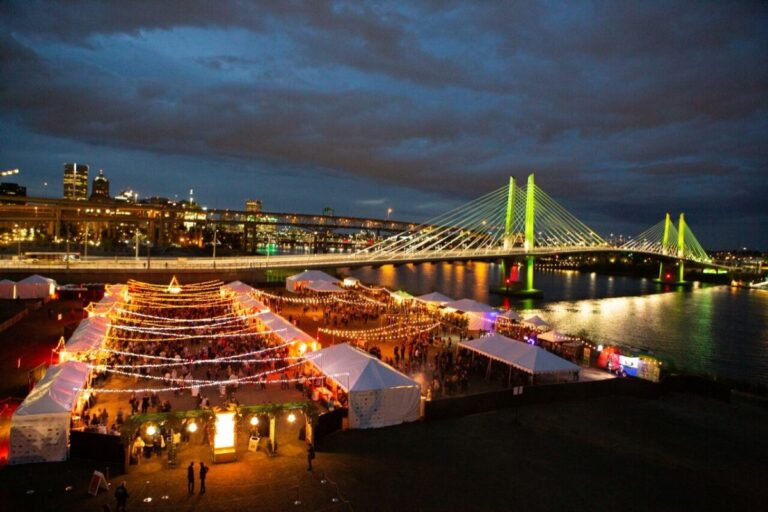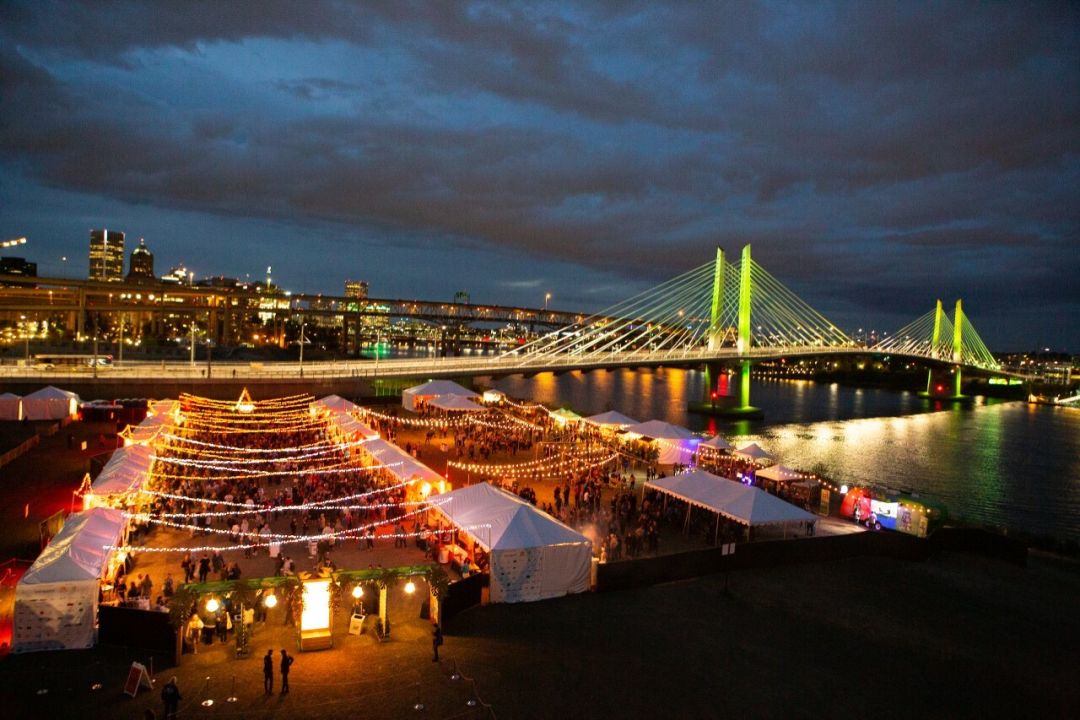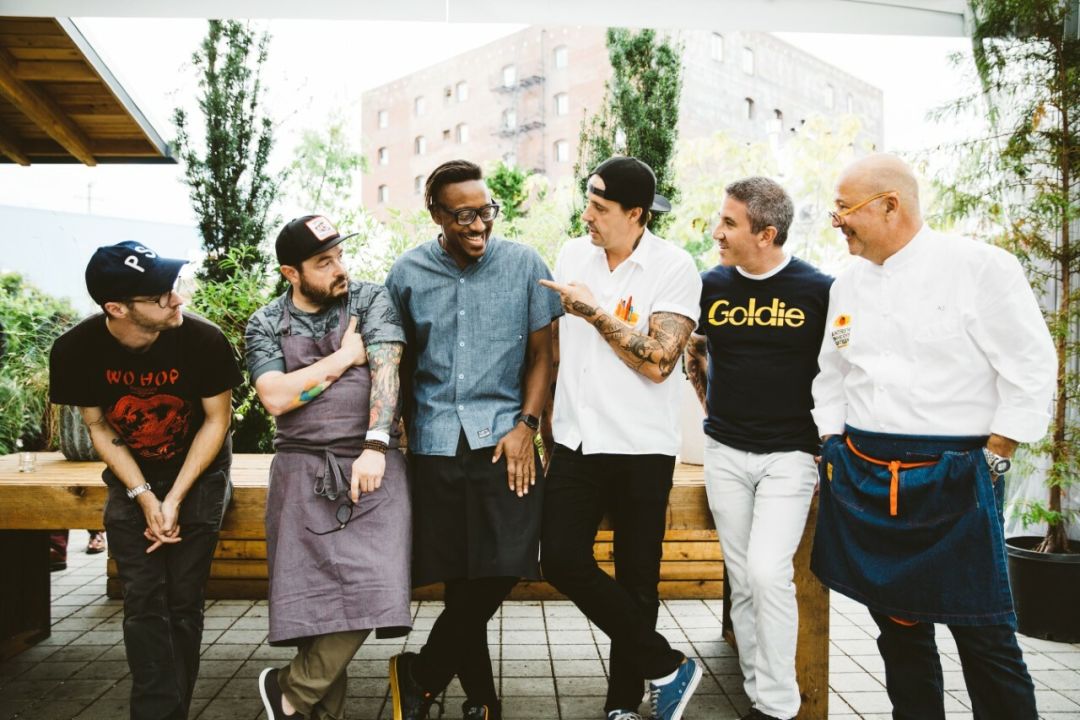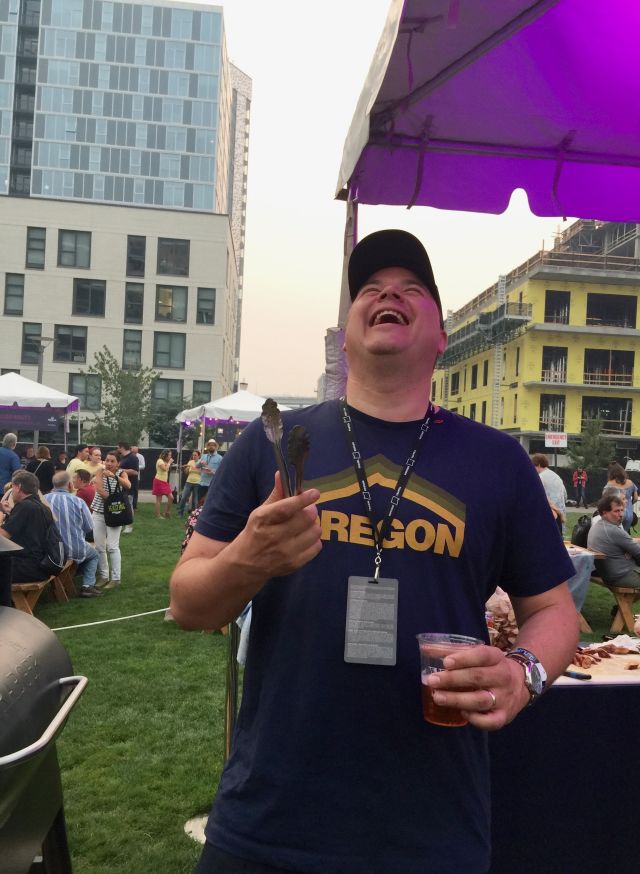

London critic Marina O’Loughlin once called Feast Portland “possibly the best food festival in the world.” But all things must pass. Signals have been rumbling since 2022’s events were put on hold. Now, it’s official. According to cofounder Mike Thelin, Feast Portland is calling it quits. Portland may never see anything quite like it again.
Consider this: in 2012, the year Feast roared into the world, food festivals were predictable events, typically a waterfront carnival or a Food Network extravaganza hosted by someone named Emeril or Mario. Mike Thelin and Carrie Welch brought to life something else altogether. Feast Portland was the culinary Burning Man, a temporary food city that unfolded—madly and epically—in public spaces, makeshift corners, restaurant back rooms, parties and after-after parties, all of it raging for three days and four nights in September.
In this wild garden of eating, chefs from all corners of the world came here to make crazy music with Portland chefs in innovative events, sandwich invitationals, intimate dinners, and spontaneous late-night food jams. Joining them at Feast’s peak in 2019: 20,000 game-for-anything eaters.
Who will forget the annual Smoked! event, which transformed Northwest Portland’s Fields Park into a vision of stainless steel grills, leaping red flames, tomahawk chops, and, one year, aged beef dangling from chains on a swing set. The whole place looked like a Cristo exhibit in Dante’s Meat Inferno, as only Portland could imagine it.

Feast dinners produced some of my most unforgettable experiences around a table, ever, including the emotion of 2018’s groundbreaking Zero Proof as five chefs (some with more medals than a four-star general) bared their souls to a small group of diners and became the new face of sobriety. I still vividly recall 2019’s African Diaspora Dinner, and the chance to taste the electrifying food of Washington, DC’s Kwame Onwuachi and the famed cake craft of Alabama pastry chef Dolester Miles, in an intimate setting.
Feast seemed too big to fail. What happened? In a wide-ranging Q&A Mike Thelin walks us through the decision and his thoughts on Portland now.
Karen Brooks: Why Feast? What drove you, through wildfire smoke and muddy fields to create what one critic lovingly called “riotous and messy, each day rammed with delicious discoveries”?
Mike Thelin: Feast was, in a way, an excuse to bring the entire food world to Portland—chefs, writers, critics, editors, literary agents, James Beard voters, anyone with influence and something to say about food. That was the mission from the beginning. A decade ago, I’d be in these food events at other cities and run into Portland chefs and we’d always say, “Why don’t we have a food festival in Portland?” We wanted everyone in Portland’s food world to feel like they were part of something bigger, which they were.
Why did you pull the plug?
The pandemic hit us hard and fast in 2020—not just Feast, but our entire event consulting business. Within two weeks, we went from normalcy to having to laying off the entire team. By summer, it was clear that Feast would not be possible in 2020.
What made you optimistic in 2021, when Feast came back briefly in the summer, super-small-scale and local only?
With the vaccine rollout, the plan was to revive some events throughout the summer with programming that was heartfelt and timely. “Summer of Feast,” as we called it, would give us a tailwind while we applied for the federal SVOG (Shuttered Venue Operators Grant), a grant that Congress created to bail out live events. As we launched the first event, news broke that vaccinated people could still transmit the delta variant; masks came back and ticket sales screeched to a halt. We stopped marketing and cut capacity, which seemed like the responsible thing to do. That same week we also learned that culinary festivals didn’t qualify for the SVOG. That was the double-gut punch. It just killed our momentum. I tried to get things going in 2022, but it was too much of a mountain to climb—operationally, emotionally, physically. It broke me.
Ten years ago, you reimagined the food festival. Why not just rethink Feast now?
Something like Feast feeds on an intense spirit of collaboration. Feast is more collaborative than any of the larger food festivals in the country. We were very intentional about connecting the culinary community in our city with other communities nationally and globally. That’s hard to pull off when everyone is raw from the trauma of the last couple of years. So many restaurants are still in survival mode, and chefs still face supply chain issues and staffing shortages. Plus, the needs of our city, the landscape and politics of the food world, have changed immeasurably. I remain a believer in Portland. I’m grateful for the opportunity we had for nearly a decade. But it’s time to close this chapter of Feast, to go out on a high note. We accomplished what we set out to do.
You always identified emerging voices, rising stars, and the importance of veteran chefs still contributing to the conversation. Who inspires you right now?
Greg Higgins, because now he’s one of last working chefs from the 1990s who set the table for the rest of us. And Vince Nguyen at Berlu, who is teeming with thoughtful, fun, and interesting ideas. Matt Lightner’s Okta, out in McMinnville, is a place Portlanders should be paying attention to. It’s probably the most ambitious food project in the history of the state.
Which Feast collaborations are you most proud of?
A chile pepper–focused dinner in 2017 brought together Mexico City’s Enrique Olvera and his protégé, Daniela Soto-Innes, with Portland’s Jose Chesa, Andy Ricker, and others. Thai street food historian David Thompson came at the last minute to be part of it, and Canadian chef Angus An drove down from Vancouver, BC, just to work in the kitchen. It illustrates how good ideas would really bring communities of chefs together. A dinner we created with Gregory Gourdet in 2019 brought some of America’s most respected Black chefs to Portland for a night, and I can’t forget an unofficial year-one after-party at Beast with Naomi Pomeroy and Sean Brock in the kitchen—and Fergus Henderson busting moves on the dance floor.
How do we continue to nurture the ideas at the core of Feast?
We need to support one another in smaller ways, and make sure that our culture of independent businesses and our neighborhoods are vibrant. That culture made Feast possible. That means getting back to offices so downtown thrives, supporting small businesses, choosing local over Amazon, and honestly, not being cruel to one another. There is way too much of that right now. The little moves will make the most difference right now. As a city, we also need to stop beating ourselves up. A lot of people here are working hard to make things better. We live in a great place, but it’s on all of us to make it better.
What will you miss most?
I miss the idealism of the project in its early days. I will never forget the pride of the first few festivals—to feel the joy of others experiencing the best our city had to offer. It was absolute magic to see so much impact from something Carrie Welch and I dreamt up over a coffee in 2011—literally, the first time we met.
Is there anything you would have done differently?
We let some of our events get too big. That cost us the intimacy of the early years.

What’s next for Mike Thelin?
First and foremost, I’m focusing on health after the stress of the last few years. I still own Hot Luck in Austin with Aaron Franklin (Franklin’s Barbecue) and James Moody, and I’m in the early stages of some new projects. As Feast goes, I hope to continue to create a handful of smaller events in Oregon and beyond. We still have a big reach and an engaged audience. We have been putting out a newsletter since May, and hope to continue. But mostly, regardless of what any of us did before COVID, I hope we can give ourselves permission to let things go and find the projects/hobbies/space that make us happy. Otherwise this entire experience we’ve just collectively endured will be for nothing.
If you could write Feast’s legacy, what would it be?
We could have taken an easier route and relied on television talent—as that is a sure bet to sell tickets. And remember: Carrie came from the Food Network and knew most of those people personally. But from the get-go, we sought our own point of view. We wanted our festival to reflect this newer food movement happening in the US, that Portland was the epicenter—not just another party for TV talent and the Michelin-starred chefs you’d see at every other festival, but more the interesting and often lesser-known chefs and restaurants who were changing how we ate.
That was a big idea a decade ago. We had a national media sponsor, but we always had the final word on all programming. We raised more than $500,000 for charities. The festival took over the city with not just official events, but unofficial ones, too. That’s when you know it’s a hit. We wanted a creative festival that was true to place, a festival that felt like Portland, Oregon. I believe we did that.